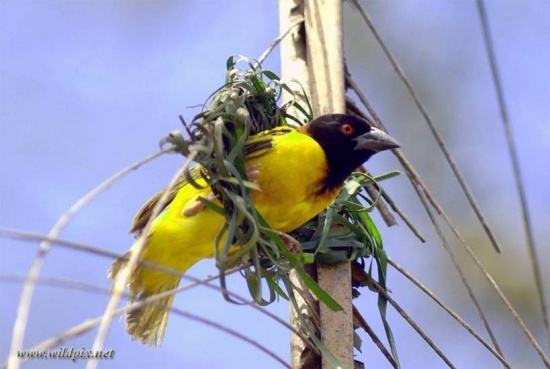| Line 1: | Line 1: | ||
[[Image:Village_Weaver.jpg|thumb|550px|right|Photo by xentox]] | [[Image:Village_Weaver.jpg|thumb|550px|right|Photo by xentox]] | ||
| + | [[Image:Village weaver breeding male.jpg|thumb|450px|right|Photo of breeding male by {{user|Scottishdude|Scottishdude}}<br/> [[Gambia]] March, 2010]] | ||
| + | |||
;[[:Category:Ploceus|Ploceus]] cucullatus | ;[[:Category:Ploceus|Ploceus]] cucullatus | ||
==Identification== | ==Identification== | ||
Revision as of 11:37, 6 April 2010
- Ploceus cucullatus
Identification
The Village Weaver is a stocky 15-17cm bird with a strong conical bill.
The breeding male has a black head and bill and chestnut nape. The upperparts and wings are yellow and black, and the underparts are yellow.
The non-breeding male has a yellow head with an olive crown, grey upperparts and whitish underparts. The wings remain yellow and black, and the eyes remain red.
The adult female has dark eyes, streaked olive upperparts, yellow and black wings, and pale yellow underparts. Young birds are like the female but browner on the back.
Distribution
The Village Weaver is a resident breeding bird species found in much of sub-Saharan Africa, and has been introduced to Haiti.
Taxonomy
Ploceus cucullatus has eight subspecies:[1]
- P. c. cucullatus
- Mauritania to Chad, south to northern Gabon and north-western DRC; also Bioko
- P. c. collaris
- P. c. bohndorffi
- P. c. frobenii
- Southern DRC
- P. c. graueri
- P. c. abyssinicus
- P. c. nigriceps
- Southern Somalia to Kenya, Tanzania and northern Mozambique; also São Tomé
- P. c. spilonotus
- South-eastern Botswana to southern Mozambique, South Africa and Lesotho
Habitat
The species lives in a wide range of open habitats, including open woodlands and human habitation, and often forms large noisy colonies in towns, villages and hotel grounds.
Behaviour
This weaver builds a large coarsely woven nest made of grass and leaf strips with a downward facing entrance which is suspended from a branch in a tree. 2-3 eggs are laid. This is a colonial breeder, so many nests may hang from one tree.
Village Weaver feeds mainly on seeds and grain, and can be a crop pest, but it will readily take insects, especially when feeding young. The calls of this bird include harsh buzzes and chattering
References
- Clements, JF. 2008. The Clements Checklist of Birds of the World. 6th ed., with updates to December 2008. Ithaca: Cornell Univ. Press. ISBN 978-0801445019.
Recommended Citation
- BirdForum Opus contributors. (2024) Village Weaver. In: BirdForum, the forum for wild birds and birding. Retrieved 2 May 2024 from https://www.birdforum.net/opus/Village_Weaver





